Cefuroxime Interactions
There are 90 drugs known to interact with cefuroxime, along with 9 disease interactions, and 1 alcohol/food interaction. Of the total drug interactions, 6 are major, and 84 are moderate.
- View all 90 medications that may interact with cefuroxime
- View cefuroxime alcohol/food interactions (1)
- View cefuroxime disease interactions (9)
Most frequently checked interactions
View interaction reports for cefuroxime and the medicines listed below.
- Aspirin Low Strength (aspirin)
- Augmentin (amoxicillin / clavulanate)
- Benadryl (diphenhydramine)
- Celebrex (celecoxib)
- Claritin (loratadine)
- CoQ10 (ubiquinone)
- Cymbalta (duloxetine)
- Eliquis (apixaban)
- Fish Oil (omega-3 polyunsaturated fatty acids)
- Flonase (fluticasone nasal)
- Lasix (furosemide)
- Lipitor (atorvastatin)
- Lyrica (pregabalin)
- Metoprolol Succinate ER (metoprolol)
- Metoprolol Tartrate (metoprolol)
- MiraLAX (polyethylene glycol 3350)
- Mucinex (guaifenesin)
- Nexium (esomeprazole)
- Paracetamol (acetaminophen)
- Probiotic Formula (bifidobacterium infantis / lactobacillus acidophilus)
- Singulair (montelukast)
- Symbicort (budesonide / formoterol)
- Synthroid (levothyroxine)
- Tylenol (acetaminophen)
- Vitamin B12 (cyanocobalamin)
- Vitamin C (ascorbic acid)
- Vitamin D3 (cholecalciferol)
- Xanax (alprazolam)
- Zofran (ondansetron)
- Zyrtec (cetirizine)
Cefuroxime alcohol/food interactions
There is 1 alcohol/food interaction with cefuroxime.
Cefuroxime disease interactions
There are 9 disease interactions with cefuroxime which include:
- colitis
- renal dysfunction
- dialysis
- ferricyanide tests
- seizure disorders
- sodium
- diabetes
- liver disease
- prolonged PT
More about cefuroxime
- cefuroxime consumer information
- Compare alternatives
- Pricing & coupons
- Reviews (153)
- Drug images
- Side effects
- Dosage information
- Patient tips
- During pregnancy
- Drug class: second generation cephalosporins
- Breastfeeding
- En español
Related treatment guides
Drug Interaction Classification
| Highly clinically significant. Avoid combinations; the risk of the interaction outweighs the benefit. | |
| Moderately clinically significant. Usually avoid combinations; use it only under special circumstances. | |
| Minimally clinically significant. Minimize risk; assess risk and consider an alternative drug, take steps to circumvent the interaction risk and/or institute a monitoring plan. | |
| No interaction information available. |
See also:
Further information
Always consult your healthcare provider to ensure the information displayed on this page applies to your personal circumstances.


